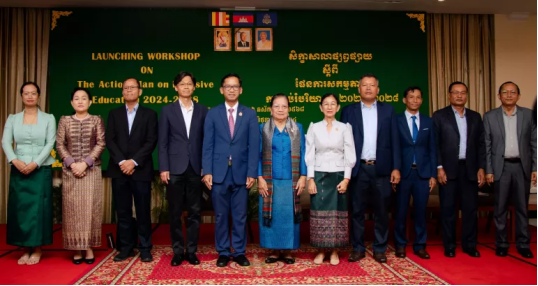
Cambodia Unveils Ambitious Inclusive Education Action Plan 2024-2028 to Support Children with Disabilities
Fiona Nanna, ForeMedia News
4 minutes read. Updated 11:30AM GMT Wed, July 3, 2024
Cambodia’s Ministry of Education, Youth and Sport (MoEYS), supported by UNICEF, launched the Inclusive Education Action Plan 2024-2028. This ambitious five-year strategy aims to ensure that all children, including those with disabilities, have access to high-quality education.
Landmark Initiative for Inclusive Education
On June 28, 2024, the Inclusive Education Action Plan was officially unveiled in Phnom Penh, marking a significant milestone for Cambodia. This comprehensive strategy underscores the country’s commitment to fostering an inclusive and equitable society where children with disabilities can thrive.
Globally, one in ten children has a disability, equating to approximately 240 million children, with nearly half residing in Southeast Asia. In Cambodia, children with disabilities are three times less likely to attend school compared to their peers. This plan addresses this stark disparity, aiming to close the educational gap.
Key Goals of the Inclusive Education Action Plan
The Inclusive Education Action Plan 2024-2028 is built on three primary goals:
- Changing Societal Attitudes: Promoting inclusiveness and preventing stigma and discrimination against children with disabilities.
- Providing Tools and Support: Ensuring access to assistive technology and services to support children with disabilities in their educational journey.
- Collaboration and Partnerships: Fostering cooperation among government bodies, NGOs, UN organizations, and development partners to create a supportive environment for children with disabilities.
Commitment from Stakeholders
Ung Borath, Secretary of State at MoEYS, emphasized the government’s dedication to inclusive education: “The adoption of the Inclusive Education Action Plan 2024-2028 demonstrates our commitment to providing quality education for all children. By addressing the barriers faced by children with disabilities, we aim to create an educational system that is truly inclusive and equitable.”
Koen Everaert, Deputy Head of Cooperation of the EU Delegation to Cambodia, echoed this sentiment, highlighting the EU’s belief in the transformative power of education: “Inclusive education for persons with disabilities provides equal opportunities and recognizes their contribution to the sustainable development of the country.”
USAID Cambodia Mission Director Kerry Pelzman added, “Inclusive education has been an integral part of USAID investments. We are proud of our partnership with MoEYS, the EU, UNICEF, and other stakeholders to ensure quality education for all children, focusing on improving literacy skills in both mainstream and special schools.”
Urgent Need for Inclusive Education
The 2019 Cambodia Population Census revealed that 689,532 people aged five and above have a disability, with approximately 37,500 of them aged five to 14. This underscores the urgent need for inclusive education initiatives.
Will Parks, UNICEF Representative in Cambodia, stressed the importance of swift implementation of the plan: “Children with disabilities face immense challenges in obtaining education, accessing healthcare, and fully participating in society. More efforts are needed to remove barriers, train teachers, and provide essential resources to ensure every child can thrive.”
The Inclusive Education Action Plan 2024-2028 is a bold and necessary step towards ensuring that all children in Cambodia, regardless of their abilities, have the opportunity to receive a high-quality education. As Cambodia moves forward with this plan, the collaboration and commitment of all stakeholders will be crucial in transforming the educational landscape and creating a more inclusive society.
For more information on inclusive education and the latest developments, visit UNICEF Cambodia and Ministry of Education, Youth and Sport.
Related Articles:
- How Inclusive Education Benefits Everyone
- UNICEF’s Role in Promoting Inclusive Education

